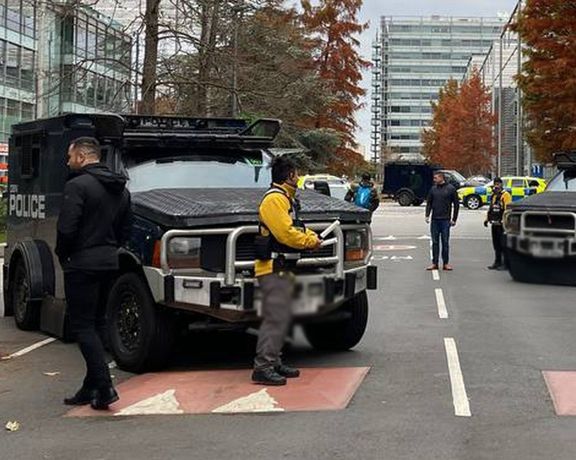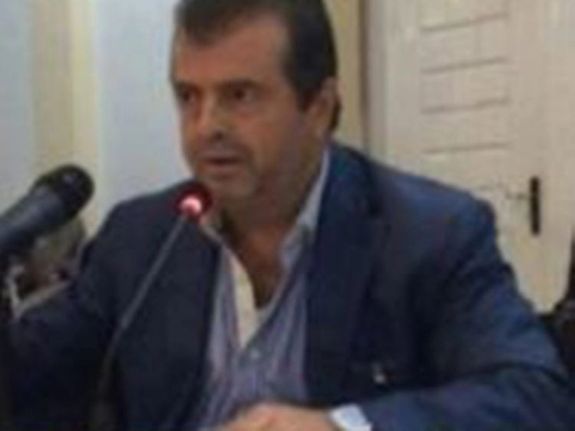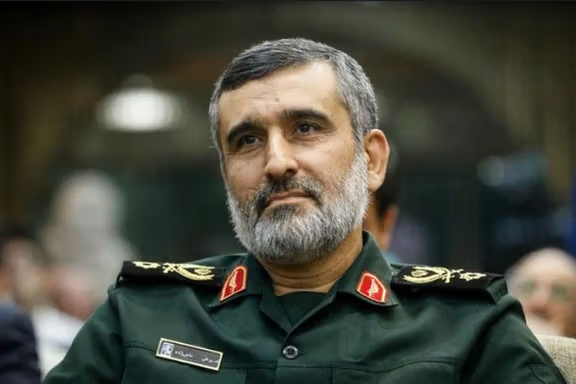International Financial Watchdog Keeps Iran On Black List

The international financial watchdog FATF has kept Iran and North Korea on its back list during its latest meeting that ended on Friday.

The international financial watchdog FATF has kept Iran and North Korea on its back list during its latest meeting that ended on Friday.
The Paris-based Financial Action Task Force is an inter-state organization that leads global action to tackle money laundering, terrorist and proliferation financing. Its recommendations impact decisions by governments and private sector firms in making banking and investment decisions.
Iran and North Korea are the only two countries on FATF’s black list, and all member states are urged to apply enhanced due diligence in dealing with them.
Experts say that even if sanctions imposed by Western countries on Iran are lifted, Tehran must adhere to FATF standards in banking and financial controls to be considered a safe business partner by international actors.
Most important are measures to prevent money laundering and financing of terrorism.
Although FATF’s decision comes as no surprise given Tehran’s refusal to accept its demands, it coincides with unprecedented financial and economic chaos in Iran in recent days.
Iran’s previous government submitted legislation to parliament in 2017 to adopt laws to implement FATF’s standards, but the hardliners have since prevented the final approval of the laws.
Opponents argue that if Iran accedes to FATF demands it will not be able to provide financial help to allied groups in the region that are part of Tehran’s “axis of resistance”.
These groups, such as the Lebanese Hezbollah and some Palestinian militant organizations, are designated as terrorist by some countries and act as proxy forces to help the Islamic Republic spread its influence in other countries.

Iran’s ministry of communications has backtracked, possibly temporarily, from a plan to provide unrestricted internet access to foreign visitors to encourage tourism.
In an interview Thursday with Miras-e Arya, a government-run news website dedicated to cultural heritage and tourism news, the communications minister, Isa Zare’i, said blocking of WhatsApp and Instagram in Iran has created “a little difficulty” for foreign tourists and that his ministry was planning to design special sim cards for them to use to be able to have better and easier access to such platforms.
Many on social media reacted angrily to the minister’s remarks and said the Iranian people had an equal right to have free access to social media platforms and websites that they wish to use.
“It’s true that a tourist, anywhere in the world, must be shown respect by the host country but it is racial discrimination and apartheid if special sim cards are provided to tourist to have specially tailored internet access when the people of that country are deprived of it,” one of the critics tweeted.
Another tweeter user pointed out that issuing such sim cards would encourage a black market.
In a statement Friday, the ministry said the reason for the plan was that foreigners visiting Iran for a short time must be allowed to connect with family and friends through their favored platforms, which are banned in Iran by law, and claimed Iranians are increasingly immigrating to unfiltered domestically-developed platforms.
The ministry went on to say there had been requests to provide limited-time tourist sim cards, which would expire when they leave the country, to provide them with access to certain filtered platforms to resolve their communications problems. “[Issuing] tourist sim cards is only a proposal and no decision has been taken about it yet,” the statement said.
The Twitter account of the government portal, PadDolat, has now removed the tweet which quoted the minister’s original remarks.
Iran has been censoring the internet and blocked most major social media platforms such as Facebook, Twitter, and YouTube for years. Amid recent protests, Instagram, the only freely accessible application which millions including small businesses and farmers used to promote and sell their commodities, was also blocked.
Social media users in Iran have largely shunned domestically developed social media applications such as Wisgoon and Nazdika, designed to replace Instagram, and Rubika, a messaging application, for various reasons including their quality and lack of privacy.
Experts have warned that domestic apps are very vulnerable to government intrusion and there are serious safety and privacy concerns including the fear that security services could be able to spy on people through them.
For years, many in Iran have relied on VPNs and anti-filtering software to navigate through government censorship and blocked social media and websites. The use of VPNs surged drastically following the recent nationwide protests. Farhikhtegan newspaper recently reported that based on a survey, 42 percent of all Iranians regularly use Telegram, and 38 percent WhatsApp and Instagram. All these platforms are only accessible if users install anti-filtering software or VPNs on their phones and computers for which they need to pay subscription fees of up to 2 million rials (around $4) per month.
Former Communications Minister Mohammad-Javad Azari-Jahromi has estimated that the market for VPNs is worth around 160,000 billion rials a year.
Iran has also been struggling with the mass cancellation of previously planned visits to Iran since protest erupted across the country in September following the death in custody of the 22-year-old Mahsa Amini who was arrested for not wearing her hijab “properly”. In November, the head of the Hoteliers Association, Jamshid Hamzehzadeh, said as much as 85 percent of all tours to Iran had been cancelled.

Canada has strongly condemned threats by the Iran's regime against journalists inside and outside the country, stressing that it supports the right to freedom of expression.
The foreign ministry told Iran International in a statement on Friday that “Ottawa stands for the right of everyone to hold opinions without interference and the right to freedom of expression and peaceful assembly, as enshrined in the Universal Declaration of Human Rights and the International Covenant on Civil and Political Rights.”
It also slammed the Iranian regime's gross and systematic violations of human rights and intimidation of its own people.
“We stand with the people of Iran, who call for change based on equality, respect and justice.”
The statement stressed that journalists, activists and media workers are the cornerstone of fair, strong and vibrant societies and must be free to do their work without fear of reprisals, political interference or intimidation.
“Any violence and intimidation against journalists or activists is completely unacceptable and must be condemned.”
Iran International was warned by British authorities in November that its journalists were under threat from Iranian agents and London’s Metropolitan Police took measures to strengthen security around the network’s office in the area.
On February 18, the network announced that following the advice of UK anti-terrorism officials it decided to temporarily move its studio operations to the US.
The decision solicited worldwide condemnations of Iran’s malign activities and specially threats against journalists.

Sweden's security service has drafted a protective act to intensify recruitment regulations in sensitive jobs for dual nationals or children of immigrants.
The measure comes after two brothers of Iranian origin in Sweden were indicted on spying for Russia last year.
The act applies to both public and private organizations engaged in "security-sensitive activities" that are important to Sweden's national security and infrastructure. The act includes almost 100,000 Iranians living in the country as well.
Any company handling "security-sensitive information," will need to conduct a personnel security assessment before hiring new staff.
According to the Swedish security service, authoritarian governments can force the families of people who want to be employed in sensitive positions to spy.
The act has been criticized and Ardalan Shekarabi, an Iranian-born member of the Swedish Parliament.
In November 2022, Sweden charged two Iranian-born brothers, Peyman and Payam Kia, with spying for Russia and its military intelligence for about a decade.
Iranian-Swedish relations have been soured in recent years after Ahmadreza Jalali, an Iranian-Swedish doctor and researcher visiting Iran was deatined in 2016 on charges of espionage and after a sham trial sentenced to death.
Stockholm also issued a life sentence for Hamid Nouri, the former deputy prosecutor of Gohardasht prison in Sweden, on his role in the mass killing of political prisoners in Iran in 1980s.

Romanian authorities say a Lebanese-Belgian citizen, who is considered a key financier of the Iranian-backed militant group Hezbollah was arrested on Friday in Bucharest.
Romanian law enforcement authorities took Mohammad Ibrahim Bazzi into custody after he arrived in Bucharest on Friday, the Associated Press reported.
Bazzi, 58, who was labeled a “global terrorist” by the United States in 2018 when $10 million was offered for information about his whereabouts, has funneled millions of dollars to Lebanon’s Hezbollah over the years, officials said.
Breon Peace, United States Attorney for the Eastern District of New York on Friday charged Mohammad Ibrahim Bazzi and Talal Chahine, both Lebanese citizens, with conspiracy “to conduct and cause American persons to conduct unlawful transactions and money laundering conspiracy.”
“As alleged, Mohammad Bazzi thought that he could secretly move hundreds of thousands of dollars from the United States to Lebanon without detection by law enforcement. Today’s arrest proves that Bazzi was wrong,” stated Peace, adding that “Our office is committed to ensuring that sanctions imposed by the US government are respected and that terrorism financiers are starved of funds.”
“The defendants in this case attempted to provide continued financial assistance to Hizballah, a foreign terrorist organization responsible for death and destruction,” stated DEA Acting Special Agent-in-Charge Daniel J. Kafafian.
“The men and women of DEA are committed to working with our law enforcement and foreign counterparts to disrupt and dismantle the operations of these organizations and those who choose to support them financially,” he added.

Iran has developed a cruise missile with a range of 1,650 km a top IRGC commander claimed Friday, as he threatened to kill former US President Donald Trump.
Separately, Amirali Hajizadeh, the head of the Revolutionary Guards aerospace force, also spoke of Iran's often repeated threat to avenge the US killing of Qassem Soleimani, Tehran’s top military and intelligence operator in the Middle East, saying "We are looking to kill (former US President Donald) Trump."
The IRGC’s provocative statements come at a time when Western powers are imposing new sanctions on the Islamic Republic and Iran’s economy is in a downward spiral.
On Saturday, the currency, rial, hit another all-time low of 565,000 against the US dollar, an almost 100-percent depreciation since September when nuclear talks with the United States, United Kingdom, France and Germany reached a deadlock.
"Our cruise missile with a range of 1,650 km has been added to the missile arsenal of the Islamic Republic of Iran," Hajizadeh, told state TV.
The television broadcast what it said was the first footage showing the new Paveh cruise missile.
The four Western powers have adopted a tougher stance against Tehran since Russia started to use Iranian-supplied kamikaze drones against Ukraine in early October. At the same time, the Islamic Republic’s bloody crackdown on popular protests and the killing of more than 500 civilians raised outrage in Europe and North America.
Hajizadeh said Iran did not intend to kill "poor soldiers" when it launched a ballistic missile attack on US-led forces in Iraq days after Iranian military commander Soleimani was killed in a US drone strike on January 3, 2020 in Baghdad.
"God willing, we are looking to kill Trump. (Former Secretary of State Mike) Pompeo ... and military commanders who issued the order (to kill Soleimani) should be killed," Hajizadeh said in the television interview.
Iranian leaders have often vowed to avenge Soleimani in strong terms.
Iran has expanded its missile program, particularly its ballistic missiles, in defiance of opposition from the United States and expressions of concern by European and regional countries. Tehran says the program is purely defensive and of a deterrent nature.
At the same time, the spokesman of Iran’s foreign ministry, Nasser Kanaani told Russia’s Sputnik website that Tehran is ready to resume the nuclear talks. He also claimed that whatever weapons it supplied Russia were before the war in Ukraine – a claim previously made by the foreign minister.
Iran has said it had supplied Moscow with drones before the war in Ukraine. Russia has used the drones to target power stations and civilian infrastructure. But multiple reports point to continues supply of drones, and Western powers have voiced concern of Iran supplying missiles to Russia, which has used most of its precision, long-range arsenal.
In November, the Pentagon said the United States was skeptical of reports quoting Hajizadeh as saying Iran had developed a hypersonic ballistic missile.
Iranian officials often make exaggerated claims about their military and intelligence prowess that cannot be verified independently.